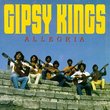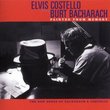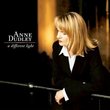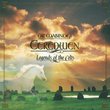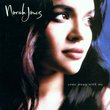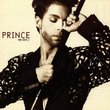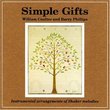| All Artists: Azam Ali Title: Portals of Grace Members Wishing: 1 Total Copies: 0 Label: Narada Release Date: 7/30/2002 Genres: International Music, New Age, Pop Style: Meditation Number of Discs: 1 SwapaCD Credits: 1 UPCs: 724381139028, 0724381139059, 724381139059 |
Search - Azam Ali :: Portals of Grace
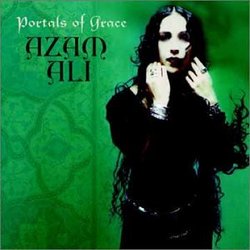 | Azam Ali Portals of Grace Genres: International Music, New Age, Pop
Azam Ali, who was born in Iran and raised in India, also sings lead for Vas. Given her background, her attraction to Western medieval traditions (she cites the German abbess-composer Hildegard von Bingen as a major infl... more » |
Larger Image |
CD DetailsSynopsis
Amazon.com Azam Ali, who was born in Iran and raised in India, also sings lead for Vas. Given her background, her attraction to Western medieval traditions (she cites the German abbess-composer Hildegard von Bingen as a major influence) makes perfect sense. After all, European early music was largely built on the Middle Eastern sounds and instruments brought home by returning crusaders. At times, Ali's vocals recall the great Spanish mezzo Montserrat Figueras, who explored the same connection but in a more earthbound, sensual manner. By comparison, Ali is an ethereal force, soaring white-winged and untouched over pungent period strings and percussion. She is equally at home in Latin, French, Ladino (the lingua franca of the Judeo-Spanish tradition), Galician (from Northern Spain and closely resembling Portuguese), and Arabic. This eclectic set will definitely thrill fans of ambient, new age, and world music, but adventurous classical listeners might also want to give it a try. --Christina Roden Similarly Requested CDs
|
CD ReviewsDead Can Dance meets Mediaeval Baebes Shantell Powell | Kitchener, ON, Canada | 07/30/2002 (5 out of 5 stars) "When you think of Persian or Indian music, you probably don't think of medieval European melodies. Azam Ali's Portals of Grace is just that, albeit tinged with an Arabic flair. Azam Ali is influenced by Hildegard von Bingen, and her mezzo soprano voice has the sombre, uplifting sound of a prayer. Master drummer Greg Ellis provides wonderful rhythm, and also vocal drones in "Inna-I-Malak".Azam Ali's music reminds me of Lisa Gerrard, in a Dead Can Dance meets Mediaeval Baebes kind of way. Azam Ali is a musical polyglot, and the songs on this album come from eclectic sources: 12th and 14th century French Provencal, Sephardic, Judeo-Spanish, Brittany, 12th century Latin, 13th century Galician-Portuguese, Sweden, Byzantine, and Arabic.This album is also great in a musical historical sense. "Lasse Pour Quois" is a tribute to the 12th and 13th centurey Trobairitz, the female poet-musicians who graced the courts of Europe. Most of these women have been forgotten. "A Chantar m'er" is the only extant melody written by one of these women, a Trobairitz by the name of Comtessa Beatrix de Dia. "Known as one of the greatest poetesses of all time, here she bitterly tells the tale of unrequited love for a man other than her husband. The opening line literally translates as, 'I must sing of that which I would rather keep in silence.'"This cd will appeal to lovers of choral, ambient, world, and new age music." Heavenly, Breath-taking, Spiritual Erika Borsos | Gulf Coast of FL, USA | 06/03/2003 (5 out of 5 stars) "Azam Ali interprets Medieval songs from the 12th - 14th century with astonishing beauty, grace, and haunting vocals. Spine-tingling sensations arise when first hearing her voice. She captivates one's spirit with every track, whether the song is from Provencal, France, or a Sephardic Judeo-Spanish tune, or a 12th Century Latin chant. Her voice is clear, fresh, pure and other-worldly. Accompanying her voice are ancient instruments, the duduk, a hurdy-gurdy, and hammered dulcimer, on track #1. Track #2 is a classic Meditarranean melody from Spain, the Arabic flavor is obvious with instruments such as the oud and percussives. They provide an exotic Middle Eastern influence. Track #4 begins with the tone of bells, simple, stark and meditative, next follows the Latin words of the German mystic, Hildegard von Bingen. Her spirituality permeates every atom of one's being ... Track #5 called "Cantiga" is about a miracle - how the Virgin Mary restored the sight of a goldsmith who became blind. The instruments are, cello, oud, and unusual ones, difficult to spell and pronounce, however the music is exotic and melodic, you begin chanting along with the singer ... Another very memorable track is #6, which is a 12th century Latin high-church hymn. Written by a French philosopher, the blend of voice and instrumentation is indescribable. However, there is an underlying sadness to the chanting vocals. If we are to believe the liner notes, some unspeakable tragedy occured to the author/composer of this hymn after he fell in love with the daughter of a nobleman. His unsanctioned love was punished by the father of the young lady. This CD is highly evocative and spiritual - it is unusual, exotic, and haunting. It is a rare modern interpretation of ancient songs and chants. The CD is valuable beyond description. Erika Borsos (erikab93)" Beauty Is Not Enough Zak Kramer | Ohio | 09/01/2002 (3 out of 5 stars) "This is, undeniably, a beautiful album. Ali's singing is lush, the instrumentation is well played and well recorded, and the choice of music is good. So why only three stars?Because, as the title of the review says, beauty alone isn't enough. And too much beauty can be like too much of any good thing. The tempos are almost identical. The rhythms are, to my ears, less diverse and intriguing than those on the Vas CDs. And Ali's voice is so perfect that the ear becomes numbed. One of the hallmarks of Middle Eastern and Indian singing is the use of microtones, which are the notes between the piano keys. The more familiar "blue notes" are a decent Western analogy. And it is this slipping between the notes, this fluidity of tone, the stretch and strain from consonance to dissonance that provides some of the power of these styles. Shifts in timbre from smooth to harsh and back are also employed, but Ali does very little of this sort of thing here. Further, despite the fact that, as several folks have already noted, the songs come from a variety of places and times, her performances and ornamentation are at times almost interchangeable. You can hear her pushing at the edges at times, but the production (and she is credited as the producer) has smoothed out these "rough" edges. In doing so, and in homogenizing the different styles represented by the music on this album, I believe that Ali shortchanges herself, and us. What could have been a great record is merely a good one, frustrating because it doesn't make that final leap.Another thing to note is that, with Vas, Ali generally sung vocables -- sounds without meaning, or, as the liner notes say, "a language of the imagination" -- a la Lisa Gerrard of Dead Can Dance. However, on "Portals," she is singing lyrics; perhaps the limitations imposed by singing (and needing to enunciate) lyrics worked against her.Comparisons to Gerrard (both sing vocables, both work/worked in a group with a male partner who was also a percussionists, both play a form of hammered dulcimer) are easy, and, unfortunately, Ali comes up short. Of course, Ali is also much younger and less experienced than Gerrard. Hopefully, on her next CD, whether it is solo or with Vas, she will take more chances and give us something more rich and deeply felt, rather than sweet and comparatively superficial. She certainly has both the pipes, the talent, and the ear for it."
|

 Track Listings (11) - Disc #1
Track Listings (11) - Disc #1
